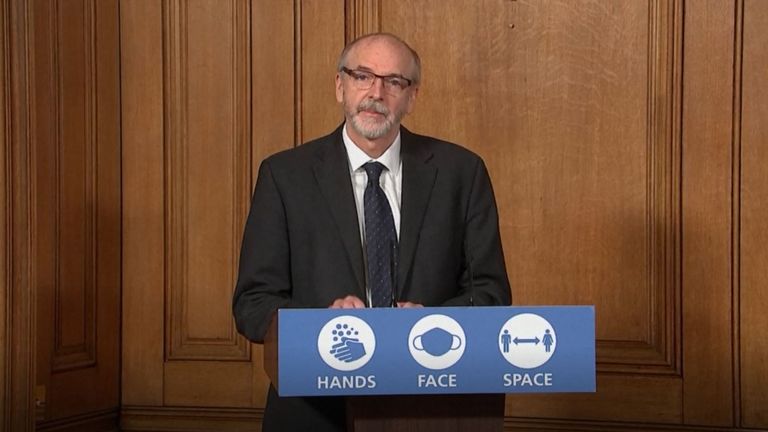COVID-19: ‘Morally wrong’ to offer coronavirus jabs to children while poorer nations suffer, says Oxford expert
It is “morally wrong” to offer coronavirus jabs to children in wealthy countries when people at greater risk in poorer nations remain unvaccinated, one of the scientists behind the Oxford-AstraZeneca shot has said.
Professor Andrew Pollard, director of the Oxford Vaccine Group, said global vaccine equality is “plain to see”.
Live coronavirus updates from the UK and across the world
Speaking to a COVID-19 All-Party Parliamentary Group, Prof Pollard said children had “near-to-zero risk” of severe disease or death from coronavirus and that global vaccine inequity is “plain to see”.
Prof Pollard’s comments come a day after Health Secretary Matt Hancock said that the UK had secured enough vaccines to offer Pfizer jabs to children aged 12 and older if approved by the medicines regulator.
The US Food and Drug Administration has already approved the Pfizer vaccine for over-12s.
But Prof Pollard said: “When you look at the overall aim of a global vaccination programme in a pandemic, it’s to stop people dying.
“And we know who those people are – that’s the over-50s, it’s those who’ve got health conditions, and to some extent also healthcare workers.
“And so those are the priority groups.”
Prof Pollard continued: “We are in a situation at the moment, where there are many unvaccinated people in the world, but not enough doses for everyone yet.
“But there are many unvaccinated people in the world, whilst people whose risk is extremely low are being vaccinated, including children, who have near-to-zero the risk of severe disease or death.”
Referring to the challenges faced in countries like India, he said: “It feels completely wrong to be in a situation morally where we were allowing that to happen, whilst in many countries, vaccines are being rolled out to younger and younger populations at very, very low risk.”
The World Health Organisation’s Professor Kate O’Brien told the same committee that there was an “enormous gap inequity” between vaccine distribution and access in high-income countries compared to low-income countries.
“From an economic perspective, we are so interconnected around the world that the recovery of the economy domestically is dependent on a recovery globally as well,” she stressed.
AstraZeneca has committed to providing the Oxford vaccine on a not-for-profit basis for the duration of the pandemic globally and will continue to do on an ongoing basis to low and middle-income countries.
This week, some parts of the UK have stepped up vaccination efforts due to the Indian variant.
Mr Hancock has urged people to get the vaccine, after confirming that there were now 2,323 confirmed cases of the variant in the UK, of which 483 were in Bolton and Blackburn with Darwen.
In Bolton, a rapid response team has been “surged” into the area, including the deployment of 50 additional vaccinators, the opening of two new vaccination centres, and six testing centres.
The rate of vaccination in the town trebled over the weekend, with 6,200 people receiving a jab.
On the wider vaccine rollout, it’s been announced that 36 and 37-year-olds will be able to book a jab from Tuesday.
Almost 37 million people have now had a first dose and more than 20.5 million have had their second.
Deaths remain low, with seven reported on Tuesday, and there were 2,412 new cases.
Subscribe to the Daily podcast on Apple Podcasts, Google Podcasts, Spotify, Spreaker
Source: Read Full Article



